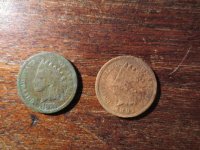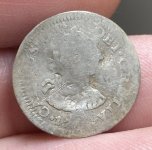Pimp Lenin
Sr. Member
According to the Official Records, there were two skirmishes fought near the town of Madisonville, Louisiana during the War Between the States. One was fought on July 27, 1862, while the other occured on February 11, 1864. I would of course LOVE to find out exactly where these skirmishes were fought.
The principal Federal unit engaged in the skirmish in February 1864 was the 3rd Maryland Cavalry. The unit was organized in Baltimore on August 8, 1863. In January 1864 the 3rd Maryland arrived in New Orleans, and sent across Lake Ponchatrain to Madisonville. For the first half of 1864, the 3rd Maryland was engaged in small actions across southeast Louisiana. In late 1864, they were sent on to Alabama. After the surrender in April, 1865, the unit returned to New Orleans and later to Mississippi, where they mustered out in September 1865.
The following is a transcript of the report submitted by Lt. Henry P. Anderson, 3rd Maryland Cavalry on the action at Madisonville, Louisiana in February 1864:
=============
Report of Lieut. Henry P. Anderson, Third Maryland Cavalry
Madisonville, LA. February 12, 1864.
SIR: I have the honor to respectfully submit the following report for your observation:
On the morning of the 11th of February, at 3 a.m., a detachment of the Third Maryland Cavalry, consisting of Capt. Adolph Bery (the commanding officer), First Lieut. Henry P. Anderson, 4 sergeants, 3 corporals, and 23 privates, of Squadron C, and Lieutenant Moore, 20 men, and non-commissioned officers of Squadron D; also Dr. Stevenson, ambulance and driver, and a guide by the name of Bailey; of of which started for the point named in your instructions to the commanding officer. The command having reached the pickets on the Ponchatoula road, an advance guard was immediately sent out, consisting of Lieutenant Moore and 12 men of Squadron D. We arrived at Mr. Fleming's farm, after travelling a distance of 20 miles, about 8:30 a.m., without molestation of difficulty. The property was immediatly searched, but nothing was found creating suspicion excepting several camp or picket fires on and about the premises. One man, pretending to be a brother-in-law of Mrs. Fleming, was arrested and closly questioned. He denied all knowledge of the enemy being there, or of their whereabouts, which proved contradictory to the statement of Mrs. Fleming, who acknowledged the presence of rebel soldiers upon the farm. During the examination of the prisoner the report was brought by Corporal Henkel, of Squadron C, to Lieutenant Moore, that a rebel soldier was seen on the edge of the woods about 200 yards distant, in an opposite direction from the house, endeavoring apparently to find out the strength of our force. Lieutenant Moore proceeded immediately with his advance guard to capture him, and if possible to discover the vicinity of others. At the same time Lieutenant Anderson, with a few men, by taking the road to the left, joined in the pursuit. Arriving at the river a junction was formed with Lieutenant Moore, after which, and unexpectedly, we were greeted by a volley of musketry from the other side of the river, Lieutenant Moore at the time receiving a wound in his back near his right shoulder blade. The depth of the river, the want of crossing, and the impenetrability of the bushes prevented further pursuit, or any means of discovering the strength or whereabouts of the enemy. We were therefore compelled to fall back on the reserve. A consultation was immediately held, Captain Bery deciding to cross the river by some means with his whole force (excepting 10 ment who were left at the house of said Fleming, for the protection of Lieutenant Moore and Dr. Stevenson), pursue the enemy, and if possible overtake them. The guide, Mr. Baily, advised Captain Bery to give up his plan of pursuit, on the ground that all probability the enemy were lying in ambush with numbers superior to our own; that we would encounter an almost interminable swamp, and he (Captain Bery) would thereby only incur a needless slaughter and a disasterous defeat. In consequence thereof Captain Bery gave up his idea of pursuit, formed his column, and withdrew his force upon the road leading to Mr. Hennen's farm; Lieutenant Moore at the same time being properly cared for and placed in the ambulance, which was sent with guard to the rear of the new advance sent out by Captain Bery.
Lieutnant Anderson, at this time, with 15 men, formed the rear guard. After having proceeded about a quarter of a mile several shots were fired from a deserted house upon the roadside, after which Lieutenant Anderson deployed his rear guard as skirmishers in a half-circle, in order to cover the retreat of the main body. Suddenly and unexpectedly we were attacked by a flanking movement which left us but one way of escape. Several volleys, however, were given in return, both by the skirmishers and the main body. The next moment the enemy came down upon us in full charge, yelling and whooping. From the best of my and my men's judgment, I should conclude their number to be from 70 to 100 men. In the mean time the horse of Captain Bery was shot out from under him, which left him in the rar of his column, and consequently, left without a commander, the men became panic-stricken at seeing their commander down at the hands of the enemy, which caused them to break ranks, and especially so when they discovered the guide at the head of the advance in full retreat. They, as a matter of course, followed hard after. The skirmishers, seeing the main body in full retreat, and all efforts on their part to repel the enemy fruitless, became discouraged and were compelled to seek safety in retreat. All efforts upon my or my sergeants' part to rally the men were of no avail. I endeavored to form the men in line after a retreat of a couple of miles, but the guide objected on the ground that a creek was running close by, the enemy in sight upon our left, and should we halt in all probability in a few moments we would be cut offand all means of escape futile. He stated that the only chance we had was in gaining the turnpike road, which we reached in safely. The doctor was forced to leave and abandon his ambulance and contents and seek refuge with the main body in retreat. The men, when spoken to of the manner in which they retreated, replied they would never stand with such a weapon as the carbine they now have. My sergeants state, of their own personal knowledge, two out of every three shots missed fire. They also state the men would onoy be throwing away their lives to no purpose whetever, and without benefit to anyone.
Our loss consisted, in Squadron C, of 1 captain, 1 corporal, 1 privated, besides 3 horses with equipments, 3 carbines, 2 sabers with accouterments, 2 saber blades, 1 pistol; in Squadron D, 1 lieutenant, 2 carbines, 1 saber blade, 1 horse with euipments. Wounded and missing: Squadron C - Capt. Adolph Bery, missing; Corpl. John C. Klinke, wounded and missing; Private Wilhelm Engel, wounded and missing; Squadron D - Lieutenant Moore, wounded and missing; Squadron G - Private B.K. Jones (driver), missing; also 1 ambulance, contents, and the two horses.
All of which is most respectfully submitted as the true result of the scout by you ordered.
Very respectfully yours,
HENRY P. ANDERSON.
First Lieutenant, Commanding Company C
Maj. Byron Kirby,
Commanding Third Maryland Cavalry.
=============
Lt. Henry Anderson, the author of the report, enlisted in the 3rd Maryland Cavalry in August 1863, and was discharged in July 1864. Captain Adolph Bery survived his wounds and was later promoted to Major. Corporal John Carl also survived his wounds and was mustered out with the unit at Vicksburg, Mississippi on September 7, 1865. He later applied for a pension. A search of the 1860 and 1870 Federal census showed no one with either the last name of Fleming or Hennen in Madisonville or St. Tammany Parish.
As one can see from the report, the Confederate States won a small victory at Madisonville one early February morning, 1864. Huzzah!
Sources:
The War of the Rebellion: A Compilation of the Official Records of the Union and Confederate Armies
Series 1 - Volume 34 (Part 1)
Pages 136 - 138
Published by the War Records Office, U.S. War Department - 1891
American Civil War Soldiers and Sailors System
http://www.itd.nps.gov/cwss/
Ancestry.com
http://www.ancestry.com
The principal Federal unit engaged in the skirmish in February 1864 was the 3rd Maryland Cavalry. The unit was organized in Baltimore on August 8, 1863. In January 1864 the 3rd Maryland arrived in New Orleans, and sent across Lake Ponchatrain to Madisonville. For the first half of 1864, the 3rd Maryland was engaged in small actions across southeast Louisiana. In late 1864, they were sent on to Alabama. After the surrender in April, 1865, the unit returned to New Orleans and later to Mississippi, where they mustered out in September 1865.
The following is a transcript of the report submitted by Lt. Henry P. Anderson, 3rd Maryland Cavalry on the action at Madisonville, Louisiana in February 1864:
=============
Report of Lieut. Henry P. Anderson, Third Maryland Cavalry
Madisonville, LA. February 12, 1864.
SIR: I have the honor to respectfully submit the following report for your observation:
On the morning of the 11th of February, at 3 a.m., a detachment of the Third Maryland Cavalry, consisting of Capt. Adolph Bery (the commanding officer), First Lieut. Henry P. Anderson, 4 sergeants, 3 corporals, and 23 privates, of Squadron C, and Lieutenant Moore, 20 men, and non-commissioned officers of Squadron D; also Dr. Stevenson, ambulance and driver, and a guide by the name of Bailey; of of which started for the point named in your instructions to the commanding officer. The command having reached the pickets on the Ponchatoula road, an advance guard was immediately sent out, consisting of Lieutenant Moore and 12 men of Squadron D. We arrived at Mr. Fleming's farm, after travelling a distance of 20 miles, about 8:30 a.m., without molestation of difficulty. The property was immediatly searched, but nothing was found creating suspicion excepting several camp or picket fires on and about the premises. One man, pretending to be a brother-in-law of Mrs. Fleming, was arrested and closly questioned. He denied all knowledge of the enemy being there, or of their whereabouts, which proved contradictory to the statement of Mrs. Fleming, who acknowledged the presence of rebel soldiers upon the farm. During the examination of the prisoner the report was brought by Corporal Henkel, of Squadron C, to Lieutenant Moore, that a rebel soldier was seen on the edge of the woods about 200 yards distant, in an opposite direction from the house, endeavoring apparently to find out the strength of our force. Lieutenant Moore proceeded immediately with his advance guard to capture him, and if possible to discover the vicinity of others. At the same time Lieutenant Anderson, with a few men, by taking the road to the left, joined in the pursuit. Arriving at the river a junction was formed with Lieutenant Moore, after which, and unexpectedly, we were greeted by a volley of musketry from the other side of the river, Lieutenant Moore at the time receiving a wound in his back near his right shoulder blade. The depth of the river, the want of crossing, and the impenetrability of the bushes prevented further pursuit, or any means of discovering the strength or whereabouts of the enemy. We were therefore compelled to fall back on the reserve. A consultation was immediately held, Captain Bery deciding to cross the river by some means with his whole force (excepting 10 ment who were left at the house of said Fleming, for the protection of Lieutenant Moore and Dr. Stevenson), pursue the enemy, and if possible overtake them. The guide, Mr. Baily, advised Captain Bery to give up his plan of pursuit, on the ground that all probability the enemy were lying in ambush with numbers superior to our own; that we would encounter an almost interminable swamp, and he (Captain Bery) would thereby only incur a needless slaughter and a disasterous defeat. In consequence thereof Captain Bery gave up his idea of pursuit, formed his column, and withdrew his force upon the road leading to Mr. Hennen's farm; Lieutenant Moore at the same time being properly cared for and placed in the ambulance, which was sent with guard to the rear of the new advance sent out by Captain Bery.
Lieutnant Anderson, at this time, with 15 men, formed the rear guard. After having proceeded about a quarter of a mile several shots were fired from a deserted house upon the roadside, after which Lieutenant Anderson deployed his rear guard as skirmishers in a half-circle, in order to cover the retreat of the main body. Suddenly and unexpectedly we were attacked by a flanking movement which left us but one way of escape. Several volleys, however, were given in return, both by the skirmishers and the main body. The next moment the enemy came down upon us in full charge, yelling and whooping. From the best of my and my men's judgment, I should conclude their number to be from 70 to 100 men. In the mean time the horse of Captain Bery was shot out from under him, which left him in the rar of his column, and consequently, left without a commander, the men became panic-stricken at seeing their commander down at the hands of the enemy, which caused them to break ranks, and especially so when they discovered the guide at the head of the advance in full retreat. They, as a matter of course, followed hard after. The skirmishers, seeing the main body in full retreat, and all efforts on their part to repel the enemy fruitless, became discouraged and were compelled to seek safety in retreat. All efforts upon my or my sergeants' part to rally the men were of no avail. I endeavored to form the men in line after a retreat of a couple of miles, but the guide objected on the ground that a creek was running close by, the enemy in sight upon our left, and should we halt in all probability in a few moments we would be cut offand all means of escape futile. He stated that the only chance we had was in gaining the turnpike road, which we reached in safely. The doctor was forced to leave and abandon his ambulance and contents and seek refuge with the main body in retreat. The men, when spoken to of the manner in which they retreated, replied they would never stand with such a weapon as the carbine they now have. My sergeants state, of their own personal knowledge, two out of every three shots missed fire. They also state the men would onoy be throwing away their lives to no purpose whetever, and without benefit to anyone.
Our loss consisted, in Squadron C, of 1 captain, 1 corporal, 1 privated, besides 3 horses with equipments, 3 carbines, 2 sabers with accouterments, 2 saber blades, 1 pistol; in Squadron D, 1 lieutenant, 2 carbines, 1 saber blade, 1 horse with euipments. Wounded and missing: Squadron C - Capt. Adolph Bery, missing; Corpl. John C. Klinke, wounded and missing; Private Wilhelm Engel, wounded and missing; Squadron D - Lieutenant Moore, wounded and missing; Squadron G - Private B.K. Jones (driver), missing; also 1 ambulance, contents, and the two horses.
All of which is most respectfully submitted as the true result of the scout by you ordered.
Very respectfully yours,
HENRY P. ANDERSON.
First Lieutenant, Commanding Company C
Maj. Byron Kirby,
Commanding Third Maryland Cavalry.
=============
Lt. Henry Anderson, the author of the report, enlisted in the 3rd Maryland Cavalry in August 1863, and was discharged in July 1864. Captain Adolph Bery survived his wounds and was later promoted to Major. Corporal John Carl also survived his wounds and was mustered out with the unit at Vicksburg, Mississippi on September 7, 1865. He later applied for a pension. A search of the 1860 and 1870 Federal census showed no one with either the last name of Fleming or Hennen in Madisonville or St. Tammany Parish.
As one can see from the report, the Confederate States won a small victory at Madisonville one early February morning, 1864. Huzzah!
Sources:
The War of the Rebellion: A Compilation of the Official Records of the Union and Confederate Armies
Series 1 - Volume 34 (Part 1)
Pages 136 - 138
Published by the War Records Office, U.S. War Department - 1891
American Civil War Soldiers and Sailors System
http://www.itd.nps.gov/cwss/
Ancestry.com
http://www.ancestry.com



 RR
RR



